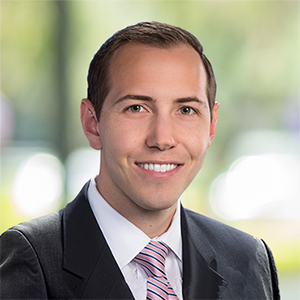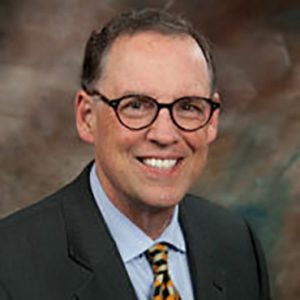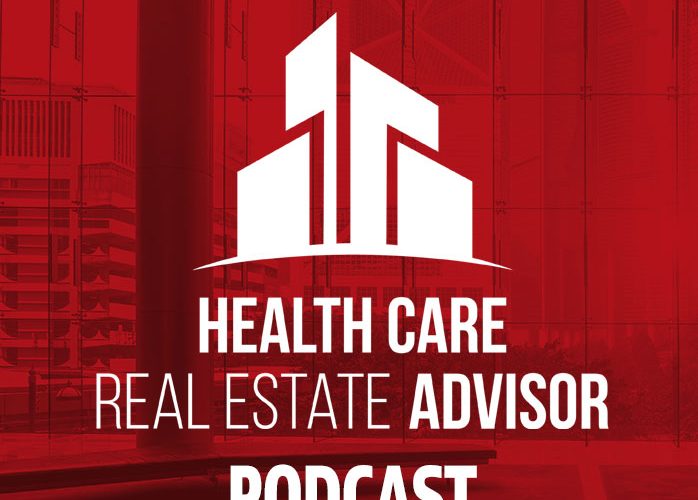Illinois Property Tax Exemptions
An interview with Mark Deaton and L.J. Fallon – Illinois Property Tax Exemptions:
In this episode, Joel Swider interviews Mark Deaton, General Counsel for the Illinois Hospital Association, and L.J. Fallon, General Counsel for the Carle Foundation, about a recent decision impacting hospital-based property tax exemptions.
Podcast Participants

Joel Swider
Attorney with Hall Render

L.J. Fallon
General Counsel for the Carle Foundation

Mark Deaton
General Counsel for the Illinois Hospital Association
Joel Swider: Well hello, and welcome to the Health Care Real Estate Advisor Podcast. I’m Joel Swider, and I’m an attorney with Hall Render. Please remember that the views expressed on this podcast are those of the participants only, and they do not constitute legal advice. Today we’ll be talking about the recent Illinois Supreme Court decision in Oswald v. Hamer and its impact on property tax exemption for Illinois Hospitals. I’m joined today by LJ Fallon, Executive Vice President and Chief Legal and Human Resources Officer at the Carle Foundation Health System, and Mark Deaton, Senior Vice President and General Counsel at the Illinois Health and Hospital Association. LJ and Mark, thanks for joining me.
LJ Fallon: You’re welcome.
Mark Deaton: Very welcome.
Joel Swider: So, Mark, let’s start with you. Could you give us some background, fill us in on what’s been going on over the past six or seven years with respect to property tax exemptions for Illinois hospitals, leading up to Oswald, which we’ll focus on in just a minute?
Mark Deaton: Sure. Well, six years ago, what I will call the New Statute, section 15-86 of the Property Tax Code, became law in Illinois. That New Statute was the subject of the Oswald case that you mentioned. Six years ago, our Department of Revenue started applying the New Statute immediately, and granting hospitals property tax exemptions under that new law. But the law was also immediately challenged in court that very year, and in one of those cases, the Carle case, that I think we’ll talk about a little bit more, the appellate court declared the New Statute unconstitutional in January 2016. So, at that time, our Department of Revenue stopped processing applications under the New Statute. But that ended up being about a one year hiatus, because in December of ’16, a different appellate court appealed the New Statute in the Oswald case, and DoR started applying the law again. The unfavorable Carle appellate court decision was eventually vacated, and I think that pretty much brings us up to the present, when our Supreme Court appealed the statute last month.
Joel Swider: Mm-hmm (affirmative). Well, and could you give us, before we proceed further into these two cases, the Carle case and the Oswald case, give us an idea of the distinctions between the two statutes that are at play here? There’s Section 15-65 of the Illinois Property Tax Code, which is kind of the general charitable statute, and has been around for a while, and then 15-86 which is the one you just mentioned, which applies only to hospitals and has a balancing test component to it?
Mark Deaton: Sure. You put your finger on one distinction between what I’ll call the old law and the new law. The old law applied, generally, to all charitable organizations. So not just organizations but things like YMCAs or Scout camps or museums, et cetera. The new statute applies expressly to hospitals and health systems. The old law was really rather murky and fuzzy, not quantitative, whereas the new law, designed for hospitals, is very specific, mathematical. It measures the value of healthcare services that are delivered to the poor and underserved, and then it compares that number to the value of property tax exemption.
Mark Deaton: One huge problem under the old statute is that the language was very close to the constitutional test, which still applies. The Constitution requires that property be used exclusively for charitable purposes, and the old statute required that the property be owned by an institution of public charity. So, very similar language, and it led to a lot of confusion. I think the primary distinction is the new law applies only to hospitals and health systems, and it is a very quantitative, mathematical test.
Joel Swider: Okay. And, of course, there’s a Constitutional Directive here too, that I think overlays both of these statutes. And maybe we’ll get into that as we talk about these cases. LJ, switching gears, the Carle Foundation Health System has been involved in its own property tax exemption battle, which started before Oswald, endures past Oswald, and continues to the present day. Could you give us some background on Carle’s tax exemption challenge from the City of Urbana, Cunningham township, and what’s been going on? How much is at stake here?
LJ Fallon: Sure. So, this all generated in the late 20th century, 1999, early 2000. The for-profit Carle Clinic Association and the not-for-profit Carle Foundation entertained the idea of integrating, or merging. And what that would do for the local properties is, because Carle Clinic was for-profit it was paying property taxes on the properties that it inhabited. So there were concerns from the local entities, taxing bodies, that should there be an integration, that that tax revenue would go away.
LJ Fallon: So, the local taxing bodies were on alert. That being the case, the integration did not go forward at that time. The taxing bodies were still concerned, and that generated some discussions, and some actions, by those taxing bodies with Carle, and resulted, in 2002, in a settlement agreement that Carle reached with the City of Urbana, Cunningham Township, the park and school district, whereby Carle made some payments. Not strictly a payment in lieu of taxes, but made some payments over a five-year period. In return, those signatories to that agreement agreed that they would not challenge Carle’s property tax exemption going forward.
LJ Fallon: Roll forward, if you will, to 2004, and the Cunningham Township Assessor put specific properties of Carle’s, the Carle Foundation tax-exempt properties, on the tax rolls. Carle appealed that to the Board of Review. The Board of Review didn’t grant those exemptions. The matter ultimately went to the Illinois Department of Revenue who also found, by 2007, so there was some passage of time with the proceedings before the local Board of Review and the Illinois Department of Revenue. In 2007 the Illinois Department of Revenue for the four parcels at issue did deny the exemption request, stating that the properties were not in exclusive charitable ownerships, or charitable use. So, that, then, caused Carle to move forward, both with an administrative claim before the Illinois Department of Revenue, and its litigation in the circuit court regarding the, what Carle characterizes as the unauthorized action by the Cunningham Township Assessor to put those properties on the tax rolls. And a number of issues have been generated since then.
Joel Swider: First, I guess, give us an idea, I mean, it’s millions of dollars we’re talking about, right? I forget the number.
LJ Fallon: It is, yep. Yep, it’s $20.8 million now. During the course of the litigation, Carle did settle the matter with Urbana School District and Urbana Park District for approximately $7 million. So, there is some reduction in the amount that Carle could recover. So, the amount at issue is $20.8 million, but what Carle seeks to recover, after taking into account the settlement, is about $8 million.
Joel Swider: Okay. And part of the argument, as you were mentioning, is that, essentially, the Cunningham Township Assessor failed to enforce, or at least failed to properly enforce, the law as it existed at that time and as it now, still, exists. Is that right?
LJ Fallon: That’s right. That is our position. We did have a motion for summary judgment on that particular issue at the circuit court level, that was just ruled on in the last month and a half, and the judge at the circuit court level did not grant our motion for summary judgment on that issue, and believed that the assessor did have the authority to put those properties on the tax roll. So, that issue will be part of what is litigated in the trial that is currently scheduled for January 2nd of 2019. We disagree with the judge’s ruling on that motion for summary judgment and we believe the issue can either be appealed after trial, or can be the subject of a post-trial motion.
Joel Swider: Okay. Got it. So, one of the things, I think, that ties these two together is the fact that in 2016, as the case was winding its way through the courts, the appellate court said that section 15-86, which is that hospital exemption statute Mark was mentioning, could apply to Carle’s case, even though the tax years in question predated passage of that legislation. And, of course, we have this issue that has been raised in Oswald and, I think, now is going to come into play as Carle’s case was remanded, which is the constitutionality of 15-86.
Joel Swider: I guess, maybe, Mark’s … Could you tell us a little bit about what was the basis … And this is now, I would say, more to do with these earlier decisions, but what was the basis for holding Section 15-86 unconstitutional?
Mark Deaton: Sure. In some ways, it was very simple. As we’ve already mentioned a couple of times, there is a constitutional test for property tax exemption, and that cannot be waived or superseded by the legislature. So, the new statute says, essentially, if a hospital satisfies this new statutory test, the Director of Revenue shall grant an exemption to the hospital. So, the plaintiff’s argument in Oswald, and in Carle, I think, was that that statutory language, saying, “Shall,” was directing the Department of Revenue to grant an exemption without regard to whether the hospital satisfied the constitutional test. That the statute, the legislature, was somehow ordering the Department of Revenue to ignore the fact that there was a constitutional test.
Mark Deaton: So, the Illinois Supreme Court, in the Oswald case, last month, said, no, that was not at all the legislative intent. That it was clear from the preamble to the legislation that the general assembly understood that there was a constitutional test, and that statutes in Illinois do not have to expressly reference related constitutional provisions. A statute never has to say, “By the way, make sure you follow the constitution.” That that is taken as read.
Mark Deaton: So, boiled down to its essence, that was really the dispute in the Oswald case, and the Supreme Court resolved that by saying that both the statutory test and the constitutional test have to be satisfied by a hospital.
Joel Swider: Mm-hmm (affirmative). And, I guess, Mark, sticking with you for a minute, because I want to return to Carle and how this is going to impact that case going forward, but as part of the Oswald case, I mean, that was a facial challenge, right? Saying that there is really no set of facts under which a hospital could meet both the constitutional standard of charitability and exclusive use for charitable purposes, and could also meet this balancing test, because, as you mentioned, it was silent as to the charitable question. I guess, does that mean that hospitals just need to meet the balancing test? Or does that mean no, we need the Department of Revenue to continue to look at charitability, and maybe there’s even more of an emphasis now, after this case. What are your thoughts?
Mark Deaton: It’s always been our position, as the Supreme Court ruled, that hospitals have to satisfy both the constitutional requirement and the statutory requirement created by our, quote, new statute. The constitutional language says that exempt property must be used exclusively for charitable purposes. That’s the constitutional test. We refer to it as the, quote, use test. I think the big question on the horizon is exactly what does the hospital have to demonstrate, prove, or evidence, to satisfy the use test? Used exclusively for charitable purposes? That question was not answered in the famous [Purlina 00:14:14] decision back in 2010.
Joel Swider: Sure.
Mark Deaton: That court did not come to a decision on what that meant. Our position is that it’s a relatively simple, non-quantitative test, that if you’re using your property exclusively for providing healthcare for all who need and apply, that’s a charitable purpose. But I think that will be the next battleground for those who oppose hospital property tax exemption.
Joel Swider: I guess, switching back, then, to LJ, I mean, now we see, okay, the statute is constitutional, as Mark mentioned. The court talks about this. Well, you’ve still got to meet the charitable test. That was always part of it. In fact, that’s a key component of the argument. But how is this going to impact Carle’s exemption claims? They’re going to be governed by 15-86 as per that earlier decision. And Carle’s case has been remanded. Is that, and maybe this is a procedural question, is it still going to be adjudicated under 15-86, or is there some chance that the court would say, “You know, we take that back”? I assume that’s been settled at this point.
LJ Fallon: Right. So, we had claims in our case, both under 15-65, so the broader charity exemption, property tax exemption that Mark referenced, and then also under 15-86. So, after the Oswald decision, in the last couple of weeks filed a motion to dismiss our 15-65 claims. It’s our position that 15-86 and the Oswald opinion apply in the Carle case, and that, again, as Mark referenced, that the constitutional test, as articulated in the Oswald opinion, is … And we’re taking the position that the exempt property must be used to benefit an indefinite number of people by promoting their general welfare or lessening the burdens of government. So, it isn’t a quantitative standard, and it is one that we believe Carle meets, not only the use test, but also the ownership test as well. So, that will, obviously, be the subject of the trial, and that will proceed at the beginning of 2019.
Joel Swider: Okay. And, I guess, last question, then, LJ. I think the Oswald case was fairly limited, in the respect that it was a facial challenge. No set of circumstances, it was really kind of examined in a vacuum. Is there any chance, and obviously this is pure speculation, so we won’t hold you to it, but is there any chance that the court would say, “Well, you know what? As applied, here,” or maybe in Carle’s case or others, “As applied here, we don’t think it’s constitutional, because of …” For whatever reason. I mean, do you think that? Or do you think 15-86 is pretty well settled law at this point? Any thought given to that as you’re going forward?
LJ Fallon: I wouldn’t hazard a guess, because I will admit that some of the rulings that we’ve seen at the circuit court level, as well as, even, the appellate and Supreme Court level in the Carle case, have not necessarily followed the logic that we thought they might. So, is there a possibility that Judge Rosenbaum, who’s newly assigned to this case, would find that 15-86 doesn’t apply to the Carle situation? I suppose that’s always a possibility. We hope that that won’t happen, and that’s why we dismissed the 15-65 claims that we had as alternative claims in our lawsuit, so that the argument really would be focused on 15-86.
LJ Fallon: So, of course the judge could make that determination. We, of course, would appeal that. We believe that the Oswald opinion is solid, and, again, the question of exclusive use is something, again, that we believe is pretty clearly articulated in the Oswald opinion. The defendants in the case, as you would imagine, do not believe that to be the case.
Joel Swider: Interesting. All right. Well, this is certainly going to be one to watch, and, of course, good luck, LJ, with it. Because I think not only in Illinois, but I think other states are looking closely at this, and obviously we represent a number of hospitals in the Midwest and throughout the country that I think are … Their ears are perked up to see how this comes out. And these debates have been raging, as you know, in other states. So, we’ll be continuing to monitor that. LJ, I really appreciate, LJ and Mark, both of your time today. So, thanks a lot for joining us. I appreciate it.
LJ Fallon: You’re very welcome.
Mark Deaton: You’re very welcome. Thank you.
Joel Swider: Thanks, and I’ll remind our listeners for more Health Care Real Estate Content, please subscribe to our podcast. And if you’d like to be added to our monthly Health Care Real Estate Advisor newsletter, feel free to send me an email. Jswider@hallrender.com, J-S-W-I-D-E-R at Hall Render dot com.

